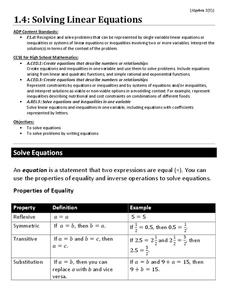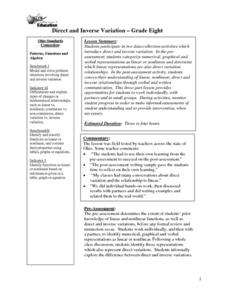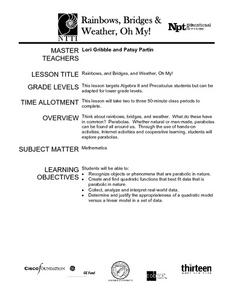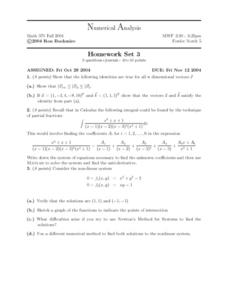Curated OER
Very Varied - Inverse variation
Students identify inverse variations. For this inverse variation lesson, students explore graphs and identify the inverse variation. They write equations for the inverse variation. Students compare and contrast the inverse variation...
Curated OER
Function Machines
In this math worksheet, students use function machines to complete an x/y T chart. Students convert between Celsius and Fahrenheit temperatures using a function machine.
Curated OER
Building a General Quadratic Function
Learners rewrite a general quadratic function by completing the square to see a new form of the function that more easily identifies the x-coordinate of the vertex and the two roots of the function.
Curated OER
Linear Equations
In this algebra worksheet, student linear equations through addition, subtraction, multiplication and division. They check their work algebraically. There are 26 problems.
EngageNY
The Computation of the Slope of a Non-Vertical Line
Determine the slope when the unit rate is difficult to see. The 17th part of a 33-part series presents a situation that calls for a method to calculate the slope for any two points. It provides examples when the slope is hard to...
Curated OER
Rewriting Equations &Formulas
Practice with literal equations. Solve for one variable in terms of another. Find the value of y given specific values of x. This short instructional activity would make a good warm-up activity at the beginning of class or a quick...
Curated OER
Impossible Graphs
Students practice plotting functions on the Cartesian coordinate plane while participating in a discussion about the Possible Or Not worksheet/activity. Students also use the Impossible Graphs worksheet to practice reading a graph,...
Curated OER
Numerical Analysis: Systems of Linear Equations
In this linear equation worksheet, students use the iterative method to solve systems of equations. Explanations and examples are provided. This four-page worksheet contains approximately three problems.
EngageNY
The Slope of a Non-Vertical Line
This lesson introduces the idea of slope and defines it as a numerical measurement of the steepness of a line. Pupils then use the definition to compare lines, find positive and negative slopes, and notice their definition holds for...
EngageNY
Mid-Module Assessment Task: Grade 8 Module 6
Make sure pupils have the skills to move on to the second half of the module with a mid-module assessment task. The formative assessment instrument checks student learning before moving on to the rest of the lessons in the unit.
Curated OER
Comparing Value for Money: Baseball Jerseys
Learners step up to the plate as they first complete an assessment task using linear equations to determine the best company from which to buy baseball jerseys. They then evaluate provided sample responses identifying strengths and...
Mathematics Assessment Project
Matching Situations, Graphs and Linear Equations
What do guitars, candles, and helicopters have in common? They're all in this resource. Learners complete an assessment task to determine the amount of profit made in a guitar class based on given information regarding variable...
Curated OER
Solving Linear Equations
Use this worksheet for practice or review solving linear equations in one variable. Problems range from multiple-step problems involving parentheses and combining like terms, to word problems, to equations with no solution or infinitely...
Explore Learning
Quadratics: Polynomial Form
Throught this subscription-based sight, learners explore different aspects of the parabola by changing equations from standard to vertex form. Next, find the general form of the vextex based on the values of a, b, and c, and investigate...
Texas Instruments
A Tale of Two Lines
Students graph systems of equation. In this calculus lesson plan, students graph their lines on a TI calculator. They identify the point of intersection and the type of solution.
Curated OER
Walk the Line
Learners create constant speed versus motion graphs. They will perform linear regressions on their data to describe the graphs mathematically.
Texas Instruments
Let's Play Ball with Families of Graphs
Learners explore quadratic equations in this Algebra II lesson plan. They investigate families of quadratic functions by graphing the parent function and family members on the same graph. Additionally, they write the equation of the...
Curated OER
Lessen the Loan
Middle-schoolers explore the concept linear equations. They use the internet to navigate through videos and problems. Pupils problem solve to determine rates of change, slope, and x and y-intercepts.
EngageNY
Polynomial, Rational, and Radical Relationships
This assessment pair goes way beyond simple graphing, factoring and solving polynomial equations, really forcing learners to investigate the math ideas behind the calculations. Short and to-the-point questions build on one another,...
Curated OER
Direct and Inverse Variation
Eighth graders participate in two data collection activities that involve direct and inverse variation. In the pre-assessment, 8th graders categorize numerical, graphical, and verbal representations as linear or nonlinear and determine...
Curated OER
Worksheet 1
In this math worksheet, students describe the difference between a partial and an ordinary differential equation. They give examples of 1st, 2nd, and 3rd order differential equations. Students apply this information to predator/prey...
Curated OER
Rainbows, Bridges & Weather, Oh My!
Explore how real-world applications can be parabolic in nature and how to find quadratic functions that best fit data. A number of different examples of modeling parabolas are explored including a student scavenger hunt, the exploration...
Curated OER
Who Shares my Functions?
Students examine the relationship between two equations. In this algebra lesson, students investigate linear and non-linear relationships between two equations. They discuss functions of graphs, tables and equations by making posters.
Curated OER
Numerical Analysis: Dimensional Vectors
For this dimensional vector worksheet, students prove dimensional vectors. They write systems of equations, verify solutions, and sketch graphs of the functions. This two-page worksheet contains approximately ten problems.

























